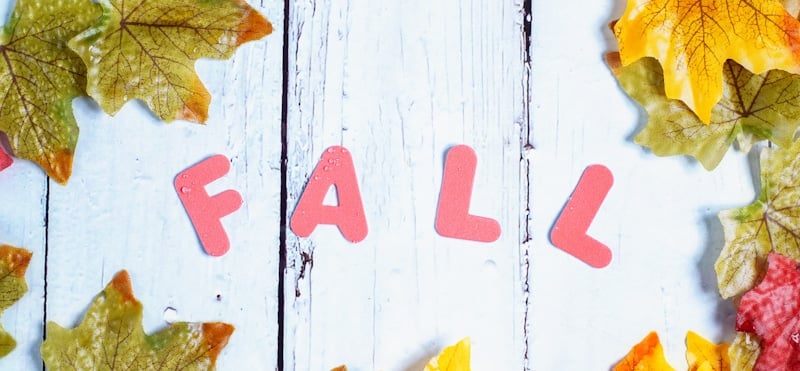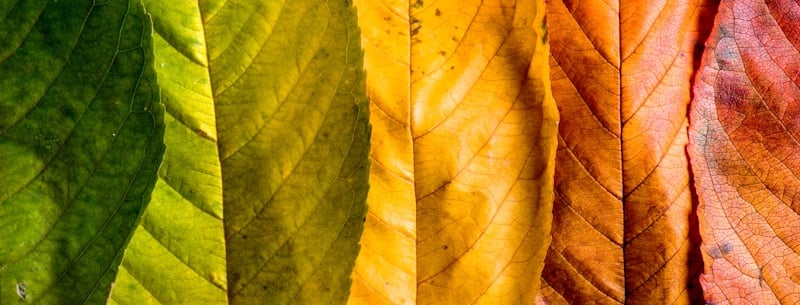Capitalization is extremely important when helping us convey the correct information and clear meaning of words. But what happens in the case of “fall,” which is a noun, a verb, and also a season?
Normally, fall is capitalized when it is at the start of a sentence or when it is part of a proper noun, like “Fall Junior Dance.” We should not capitalize the season because it is not a proper noun. But when the season is personified as in poetry, there is an edge case where it can be capitalized.
There are some general rules for capitalizing words in the English language. For example, for titles, capitalization rules indicate that you should capitalize the first word, all nouns, verbs (even short ones, like is), all adjectives, and proper nouns. We should write articles, conjunctions, and prepositions with lowercase. However, some style guides say to capitalize conjunctions and prepositions that are longer than five letters.
But what are the rules for words like fall with different meanings and structures?
Capitalization Rules For Fall
In the case of “fall,” it would only be capitalized at the beginning of a sentence. This is true regardless of whether we use fall as a noun or a verb.
As a noun: “The trees are gorgeous in the fall.”
As a verb: “He saw her fall off her bicycle.”
When we use “fall” in the sense of a season, it is not considered a proper noun; therefore, it would not be capitalized. In this case, the exception would be if fall is at the beginning of a sentence or if it is part of a proper noun such as “Fall Junior Dance.”
Below is a chart defining each term – both noun and verb -. This can help us determine if the word needs to be capitalized or not.

Does “Fall” As A Season Get Capitalized?
Seasons Aren’t Proper Nouns.
The seasons are not proper nouns and are therefore not normally capitalized. Of course, as with other nouns, they should be capitalized at the beginning of sentences and titles.
Because the names of the seasons (spring, summer, fall, and winter) are not considered proper nouns, they only get capitalized when other common nouns get capitalized. For example, a college student would write, “She is taking a science class in the summer” or “He took the class in fall 2020.” Still, a list of all the classes available might be under the heading of “Summer 2020 Science Classes.” Of course, season names should be capitalized at the beginning of sentences, as well, as in “Fall arrives in September.”
Exception: Personifying The Seasons
An example of a poetic exception is when seasons are sometimes personified or treated as beings. In those personification cases, they are often capitalized.
So, the takeaway here is this: you should not capitalize the names of the seasons unless:
1) they’re at the beginning of a sentence,
2) they’re in a title or a heading, or
3) they’re being personified.
Fall: Meanings, Capitalization And Exceptions Tables
The following tables show the different meanings of fall – both noun and verb -. Each table shows examples to see when it should be capitalized or not; if there is an exception that applies.
| Fall (noun) | ||||
| Term | Meaning | Capitalized or Not capitalized? | Example | Exception |
| Fall | The season of the year between summer and winter | Not capitalized | She starts college in the fall of 2022. | |
| Fall | Act of falling | Not capitalized | She was injured in a fall from a horse. | |
| Fall | Decrease | Not capitalized | There was a big fall in unemployment. | |
| Fall | The way something falls/happens | Not capitalized | The fall of the dice. | |
| Fall | A large amount of water falling down from a height | Not capitalized | The falls upstream are full of salmon. | Capitalized if used as a proper noun, for example, Niagara Falls. |
| Fall | Defeat | Not capitalized | The fall of the Roman Empire. | |
| Fall | Loss of respect | Not capitalized | The governor’s spectacular fall from grace. | |
| Fall (in Bible) | The Fall [singular] | Capitalized | The occasion when Adam and Eve did not obey God and had to leave the Garden of Eden. | |
| Fall (verb) | ||||
| Term | Meaning | Capitalized or Not capitalized? | Example | Exception |
| Fall | To drop down | Not capitalized | September had come, and the leaves were starting to fall. | |
| Fall | Stop standing | Not capitalized | The house looked like it was about to fall down. | |
| Fall | To hang down | Not capitalized | Her hair fell over her shoulders in a mass of curls. | |
| Fall | Slope downward | Not capitalized | The land falls away sharply towards the river. | |
| Fall | Decrease | Not capitalized | Their profits have fallen by 30 percent. | |
| Fall | Be defeated or captured | Not capitalized | Troy finally fell to the Greeks. | |
| Fall | To die in battle; to be shot | Not capitalized | There is a new memorial to those who fell in the two world wars. | |
| Fall | Become, to begin to be something | Not capitalized | She fell ill soon after and did not recover. | |
| Fall | To come quickly and suddenly | Not capitalized | Darkness falls quickly in the tropics. | |
| Fall | To happen or take place | Not capitalized | My birthday falls on a Monday this year. | |
| Fall | Move in a particular direction | Not capitalized | My eye fell on a strange object. | |
| Fall | Belong to a group | Not capitalized | This falls under the heading of scientific research. | |
Fall: Related Words, Verbs, And Idioms
To know when to use the correct capitalization, we must know all the different meanings, related words, verbs, and even idioms for their appropriate use.
Related Verbs
- Falling
Phrasal Verbs With Fall
- Fall for
- Fall in
- Fall behind
- Fall behind with
- Fall back on
- Fall back
- Fall apart
- Fall through
- Fall about
- Fall away
- Fall down
- Fall into
- Fall upon
- Fall to
- Fall over yourself to do
- Fall over to do
- Fall over
- Fall out
- Fall on
- Fall off
- Fall in with
Idioms And Examples
- Take the fall (for somebody/something) (informal)
Meaning: To accept responsibility or punishment for something that you did not do or did not do alone
Examples:
He took the fall for his boss and resigned.
Who will take the fall for the scandal?
Someone has to take the fall.
- Pride comes/goes before a fall (saying)
Meaning: If you have too high of an opinion of yourself or your abilities, something will happen to make you look stupid
- Break somebody’s fall
Meaning: to stop someone from falling onto something hard
Example:
Luckily, a bush broke his fall.
- Be riding for a fall.
Meaning: to be doing something that involves risks and that may end in disaster
Examples Sentences of Fall
When Fall Needs To Be Capitalized
- I had a great time visiting Niagara Falls on my vacation.
- Fall is my favorite time of year.
- The pastor will preach on Adam and Eve, forbidden fruit, and the Fall.
When Fall Does Not Need To Be Capitalized
- He wants to fall in love with someone.
- Mother’s day falls on a Sunday.
- The stress falls on the first syllable.
- The seeds fall to the ground and germinate.
- The house looked as if it was about to fall.
- They had been married for just a few weeks when she fell pregnant.
- My birthday falls on a Monday this year.
- The governor’s spectacular fall from grace
- They will start training in the fall of 2022.
- Someone has to take the fall.
Final Thoughts
Fall is generally capitalized when it appears at the beginning of a sentence or when it is part of the name of something.
If we are referring to the season, it is not capitalized either, unless we are referring to a specific name of an event. When seasons’ names are personified—that is, that they are being treated like beings, then they can also be capitalized.
Shawn Manaher is the founder and CEO of The Content Authority. He’s one part content manager, one part writing ninja organizer, and two parts leader of top content creators. You don’t even want to know what he calls pancakes.


